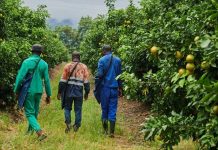Africa-Press – South-Africa. The South African Revenue Service (SARS) is one of the few state-run institutions in South Africa that still works properly. It is efficient, well-managed, and consistently meets its targets.
However, this is because it’s the agency that takes money from the public and gives it to the government—and taxpayers get very little in return.
While the efficiency of SARS should be praised under normal circumstances, it actually hurts the country’s economy because the rest of the public sector is highly inefficient.
This is according to Efficient Group chief economist Dawie Roodt, who highlighted how the strong performance of SARS only highlights the weakness elsewhere in the public sector.
“SARS is very efficient. SARS is one of the few institutions under the control of the politicians that are still working very well in South Africa,” Roodt said in an interview with BizNews.
“It makes sense, because that is where the money comes from—they’re the guys taking money out of our pockets.”
Roodt said SARS performs well because the government depends on it for money. “There’s huge pressure on SARS to collect as much as they possibly can because the state’s finances are in trouble and it needs more money,” he said.
“They are very professional, and that pressure has made them extremely effective at what they do.”
While other state-owned enterprises like Eskom, Transnet, and the Post Office have collapsed under corruption and mismanagement, SARS continues to function efficiently.
It regularly meets or exceeds its annual tax collection targets, even when the economy is struggling.
During the recent Medium-Term Budget Policy Statement, Finance Minister Enoch Godongwana announced that SARS collected R19.7 billion more than expected in the first half of the year.
The higher collections came mainly from VAT, lower VAT refunds, and stronger fuel levy and corporate tax income.
SARS’s operations are also highly efficient. Its cost-to-tax-revenue ratio is lower than most developing countries, meaning it collects more tax at a lower cost.
It has invested in digital systems and data analytics to improve compliance and detect tax evasion. Internationally, South Africa’s tax administration is regarded as one of the best among emerging markets.
The real golden goose
Efficient Group chief economist Dawie Roodt
However, Roodt said SARS’s success only highlights the weaknesses elsewhere in government.
The more money SARS collects, the more that is handed to a state that spends it poorly. “Unfortunately, it’s coming at a very dear price because the state is highly inefficient today,” he said.
“If they take one rand out of my pocket or your pocket and give it to the Minister of Finance, that money spent in the economy is worth much less than if you and I were to spend that same rand. We would spend it much more efficiently than the Minister of Finance.”
Roodt said SARS has been aggressive in its collection efforts, and tax collection seems to be running ahead of estimates.
For Roodt, this reflects one of South Africa’s biggest problems—the productive private sector is constantly funding an inefficient public sector.
“We are just taking money away from the productive side of the economy and giving it to the unproductive side, or largely unproductive side. That’s just not good for the economy,” he said.
However, he said that while frustration about how the government spends tax money is understandable, refusing to pay taxes is not the answer.
“Some people have said to me, ‘Let’s start a tax revolt because the ANC is wasting our money.’ But I don’t think that’s the right way of doing things,” he said.
“Once you succeed in a tax revolt, it’s very difficult to turn that around. And, anyway, millions of people directly depend on the state to survive.
“I think we’ve got a responsibility as South Africans to provide that social safety net—but we are certainly overdoing things.”
Roodt believes the focus should not be on squeezing more tax out of an already struggling economy, but on growing the economy itself.
“SARS is efficient because it has to be—it’s the state’s lifeline. But once that money reaches the rest of the public sector, it largely disappears into inefficiency and mismanagement.”
“The real golden goose is the economy. You’ve got to grow the economy. That’s the answer—not taking more money out of the same shrinking base. SARS is doing its job. The rest of the state needs to start doing theirs,” he said.
For More News And Analysis About South-Africa Follow Africa-Press






